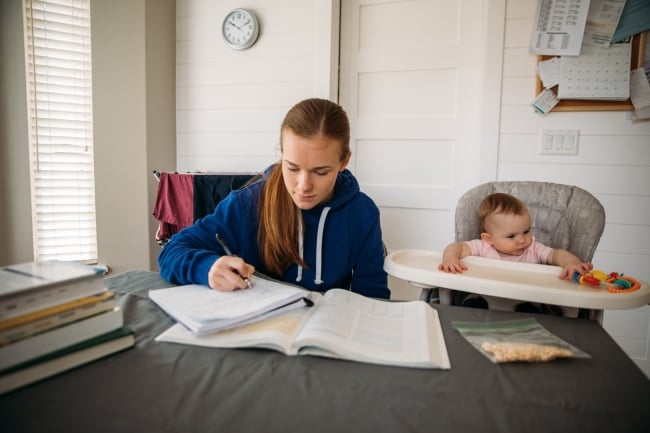You have /5 articles left.
Sign up for a free account or log in.

Teen mothers are more likely to experience domestic violence, which can impact educational goals.
RichVintage/E+/Getty Images
Parenting students face a variety of challenges in degree attainment, and experiencing intimate partner violence can be another hurdle to student success.
A new report from Generation Hope identifies the negative consequences domestic abuse has on student parents and their children, and it offers ways higher education professionals can mitigate the prevalence and impacts of domestic abuse on campus.
The problem: Domestic abuse, also known as domestic violence or intimate partner violence (IPV), is a pattern of behavior in a relationship used to gain or maintain power and control over a partner, according to the report. Abuse can be physical, sexual, emotional, economic, digital or psychological actions or threats.
Survey Says
Nationally, an estimated one in five learners in higher education is a student parent, and many are single parents.
Most parenting students are women, and many are working and enrolled part-time, according to Trellis Research. Student parents face basic needs insecurity at higher rates than their peers, as well. Trellis’s survey found three in five parents have been housing insecure, and 44 percent have had low or very low food security in the past year.
Nationally, more than one in three women and one in four men will experience IPV at some point in their lives, according to the CDC. Women between the ages of 18 and 24 are most commonly abused by an intimate partner, compared to other age groups and gender categories. Two in five (43 percent) college women who are dating have reported experiencing violence or abuse at the hands of their partner.
Intimate partner violence can impact parents’ educational pursuits through childcare sabotage and periods of unemployment. Around 66 percent of IPV survivors say their experiences disrupted their progress toward educational goals, and 44 percent had to drop or retake one or more classes as a result of the abuse they suffered, according to 2018 research.
Generation Hope offers support to 200 teen parents living in and around Washington, D.C., and New Orleans through its Scholar Program. Participant data found 20 percent of scholars have disclosed to staff they have witnessed or experienced intimate partner, family or sexual violence at some point in their lives.
In addition to impacting parenting students, children who witness intimate partner violence are more likely to perpetuate or experience violence themselves.
The solutions: To support parenting college students, higher education practitioners can consider the following actions.
- Create an inclusive environment. Student parents should feel embraced and supported at their institution if they choose to disclose that they are experiencing intimate partner violence and seek help. Student housing should also include family-friendly options and give priority to undergraduates with children.
- Identify parents. Colleges can track student parent data and adopt a strengths-based approach for policies and practices that value parenting students’ lives.
- Promote well-being. Leaders can create intervention and prevention programs for IPV and resources directed specifically at parenting students. Mental health and wellness programs should also be able to serve the experiences of student parents while acknowledging their financial and time constraints.
- Cultivate a safe space. The campus environment should be one that prioritizes student safety, whether that’s partnering with local law enforcement, maintaining family-friendly spaces for students in crisis or giving resources for children impacted by IPV.
- Communicate resources. Staff and faculty should be aware of the available services for student parents and refer them accordingly.
“The best way to ensure that these strategies are authentically and comprehensively supporting student parents who are experiencing intimate partner violence is to engage student parents at the onset,” the report says. “Considering them as experts who hold the solutions is vital to providing impactful institutional and policy supports.”
Get more content like this directly to your inbox every weekday morning. Subscribe here.



